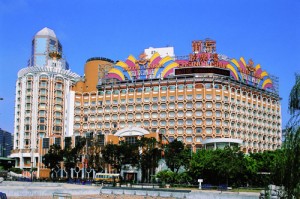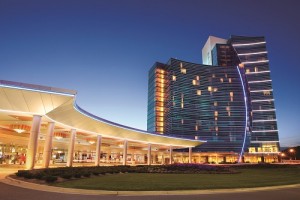Just as it looked that Macao was beginning to climb out of one government-created crisis, along comes another. According to a report in the South China Morning Post, the central government was cutting the maximum withdrawal amount from UnionPay ATMs from  $1,250 to $625. Obviously, this would put a crimp in the style of gamblers, perhaps more so at the high end than in mass-market play. Still, it’s a setback. As JP Morgan analyst Joseph Greff wrote, “While difficult/nearly impossible to assess the impact on spend per trip, the bigger impact may be on player psychology with regard to visits and spend as mainland China potentially reengages its oversight of Macau.” The catalyst, ironically, may be nothing that happened in the Chinese enclave but “unanswered claims” in Singapore, where UnionPay cardholders were allegedly exchanging vouchers for casino chips at Marina Bay Sands, a forbidden practice. (It wouldn’t be the first time Las Vegas Sands has been found pushing the envelope.) Also, UnionPay had practically inviting scrutiny by advising its customers to bring more than one card when visiting Macao.
$1,250 to $625. Obviously, this would put a crimp in the style of gamblers, perhaps more so at the high end than in mass-market play. Still, it’s a setback. As JP Morgan analyst Joseph Greff wrote, “While difficult/nearly impossible to assess the impact on spend per trip, the bigger impact may be on player psychology with regard to visits and spend as mainland China potentially reengages its oversight of Macau.” The catalyst, ironically, may be nothing that happened in the Chinese enclave but “unanswered claims” in Singapore, where UnionPay cardholders were allegedly exchanging vouchers for casino chips at Marina Bay Sands, a forbidden practice. (It wouldn’t be the first time Las Vegas Sands has been found pushing the envelope.) Also, UnionPay had practically inviting scrutiny by advising its customers to bring more than one card when visiting Macao.
Not only did the currency restriction make the front page of the SCMP, it prompted Deutsche Bank analyst Carlo Santarelli to proclaim it “takes the steam out of Macau.” He wrote that “this again reminds investors of the difficulties of investing in Macau, most notably when VIP/high-end mass are driving the market. He also seemed to think the impact was mainly psychological “given ATM transaction sourced cash was never a meaningful driver of Macau [gross gaming revenue] … Couple this with currency devaluation, capital flight acceleration and improved junket liquidity, and it  appears that Beijing is again reminding Macau patrons that they are watching.” Or, as he put it, “it is the messaging that is the issue here.”
appears that Beijing is again reminding Macau patrons that they are watching.” Or, as he put it, “it is the messaging that is the issue here.”
Indeed, the change in policy turned out this morning not to be a curb in the amount of currency that could be withdrawn but a doubling of the number of transactions required to obtain it. “This clarification would suggest less of a negative on player spend/psychology than what we initially thought, but we are still unclear as to what the motivation is behind this tweak (higher fees? Sending a message?),” Greff wrote. The bottom line, either way, is that the central government is making it more of a hassle to get currency in Macao, where players have less to fear from Lady Luck, it seems, than from Big Brother.
* As Indiana Gov. Mike Pence (R) leaves for higher office, he drops a potentially thorny issue into the lap of successor Eric Holcomb (R). Will the latter continue Pence’s “no expansion” policy on casino gambling? He’ll be tested right away as the Bureau of Indian Affairs has approved the Pokagon Band of Potowatomi Indians‘ plan for a $400 million casino in South Bend. This is, no two ways about it, an expansion. If Holcomb compacts with the Pokagon Band, there will be a great hue and cry from existing casino operators if the revenue-sharing component is less than the 30% tax they pay the state. It could also reopen the can of worms first cracked by Full House Resorts, which wants to bisect its license and move half its Rising Sun gaming inventory to a site in Indianapolis. If Indiana is adding a casino, surely more than one can’t hurt can it?
This is far from the Potowatomi’s first rodeo. The nation already owns 20 casinos in  Michigan and their effect has been felt in Indiana. Boyd Gaming‘s Blue Chip riverboat has seen its revenues go from $267 million in FY07 to $162 million in FY16. (In this sense, adding a tribal casino might be attractive to Holcomb, as it would keep some of that fugitive revenue in the state.) Unfortunately for the state, dining, gasoline sales and tobacco products would all be tax-free on Pokagon land. For the time being, the Casino Association of Indiana is taking the new development in stride. Said CEO Matt Bell, “As a sovereign nation, they have every right to engage in this practice. And they have a history of doing it well.”
Michigan and their effect has been felt in Indiana. Boyd Gaming‘s Blue Chip riverboat has seen its revenues go from $267 million in FY07 to $162 million in FY16. (In this sense, adding a tribal casino might be attractive to Holcomb, as it would keep some of that fugitive revenue in the state.) Unfortunately for the state, dining, gasoline sales and tobacco products would all be tax-free on Pokagon land. For the time being, the Casino Association of Indiana is taking the new development in stride. Said CEO Matt Bell, “As a sovereign nation, they have every right to engage in this practice. And they have a history of doing it well.”
Hoosier State gamblers were feeling expansive with their spending last month, wagering 6% more, even as foot traffic fell 4%. Blue Chip ($13 million) was flat, as was Belterra ($8.5 million) but Pinnacle Entertainment made up for the latter at Ameristar East Chicago, up 5% to $17 million. Caesars Entertainment was flat at Horseshoe Southern Indiana ($20 million) and was 2% off at top-grossing Horseshoe Hammond ($32 million). Hollywood Lawrenceburg was up 8% to nearly $14 million, while Rising Sun gained 11%, to $4.5 million. Majestic Star I was up 3%, to $7 million, while its less-popular sibling lost 2% to $5 million. As usual, the racinos did well, with Indiana Downs up 4% to $21 million and Hoosier Park gaining 3.5% to $16 million. French Lick Resort rose 5% to nearly $7 million but under-renovation Tropicana Aztar yielded 2% less, for a still-respectable $10 million.

